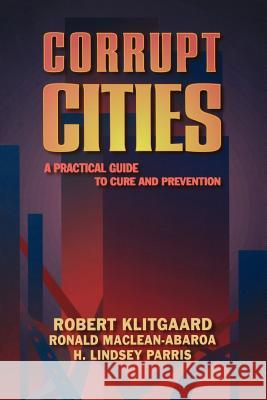Corrupt Cities: A Practical Guide to Cure and Prevention » książka
Corrupt Cities: A Practical Guide to Cure and Prevention
ISBN-13: 9780821346006 / Angielski / Miękka / 2000 / 172 str.
The movement toward decentralization, accountability, and democratic forms of government at the local level is gathering momentum and the enormous costs of corruption are being explicitly recognized. Corruption is an entrenched symptom of misgovernance often reflected in patronage, red tape, ineffective revenue-generating agencies, large-scale bribery in procurement, and failure to deliver services to city dwellers. But when local officials are accountable to their citizens, decisionmaking can become participatory. In turn, a participatory process can be the cornerstone of a strategy to reform 'sick' institutions and improve the welfare of city dwellers. 'Corrupt Cities' is an important contribution to this emerging field, addressing the historical, traditional, and cultural contexts that create perverse incentives for corruption to exist. At the same time, this book provides practical solutions and a set of incentives charting a path away from misgovernance toward effective local governance. The authors present case studies of both success and failure to underscore that addressing corruption is only an entry point to deeper public-sector reforms. The book serves as a guide for local reformers and citizen groups intent on changing corrupt systems by introducing practical strategies to combat corruption and to reform local institutions. Practical tools and approaches are presented, including fiscal transfers, systems to track public revenues and expenditures, simplified rules to improve the procurement process, diagnostics, and participatory techniques for developing and monitoring local budgets.











